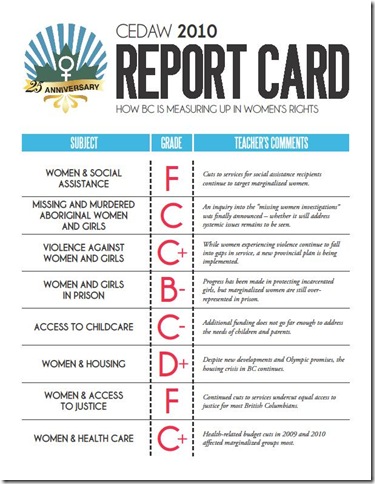October 18, 2010 – British Columbia has a C- average in women’s rights, according to the second annual West Coast LEAF CEDAW Report Card, released today. The report is being released on Persons Day, the 1929 victory that established many women as "persons" under the law and eligible for appointment to the Senate.
The Report Card uses statistics and reports to measure BC’s performance against the United Nations Convention on the Elimination of all forms of Discrimination Against Women (CEDAW).
Last year’s average was a "D". While there has been some improvement this year, West Coast LEAF is disappointed that the Province is still receiving failing grades in providing access to justice and social assistance to vulnerable women and families. Both the legal aid and social assistance systems in BC have been subject to budget and service cuts over the past year that impact women disproportionately.
The report covers important legal and social issues such as Women & Housing and Access to Childcare. Missing and Murdered Aboriginal Women and Girls climbed from an F to a C, largely due to the long-awaited announcement of a public inquiry into the conduct of the "missing women investigations". However, in order to satisfy CEDAW requirements the Inquiry must address the systemic issues in these cases – whether it will do so remains to be seen.
Women & Health Care is a new subject this year and was graded C+. Health care provision in BC is overall positive, but doesn’t go far enough in addressing the needs of marginalized residents of BC, especially following cuts to spending and programs in recent years.
"It’s been 81 years since we celebrated an important milestone with Persons Day, yet we’re still struggling with the challenges of women’s equality in this province," says West Coast LEAF Legal Director Kasari Govender. "This year’s grades reflect some of the promises that have been made regarding improved services for women and families, but the fulfillment of women’s rights requires more than just words. Women leaving relationships require greater access to the courts, women with disabilities need better supports, and Aboriginal women and girls deserve to know that their safety is a priority in our justice system."
The report was compiled by West Coast LEAF with input from various community organizations.
Excerpts from the report:
* BC still has the highest overall rate of poverty in the country at 11.4%, as well as the highest rate of child poverty in Canada at 10.4%.
* A recent study by the Federation of Canadian Municipalities comparing 24 different Canadian cities placed Vancouver at the top of the list for cities with the largest gap between rich and poor, the highest percentage of working poor families, and the highest percentage of low income residents.
* The 2009 Cost of Eating in BC report produced by the Dietitians of Canada clearly demonstrates that more than 100% of the amount that social assistance recipients receive is required for adequate housing and food alone.
* In 2010, the BC Government failed to renew funding for the Highway of Tears Project, a project aimed at preventing further deaths and disappearances along this notorious stretch of BC highway.
* While the RCMP and many local police forces in BC have policies to determine who is the primary aggressor in spousal violence incidents, there are continued reports by women and their advocates of the police failing to implement this policy and therefore arresting both spouses, even where a woman is clearly the victim of her partner’s abuse.
* The government announced that full school-day kindergarten would be available for up to 50% of kindergarten students in 2010 and for every five-year old starting school in 2011. However, the Government has only pledged $129 million in annual funding by the time the program becomes fully operational, in spite of the finding of their own Early childhood Learning Agency, which estimates that annual operational costs will be in the range of $615 million.





